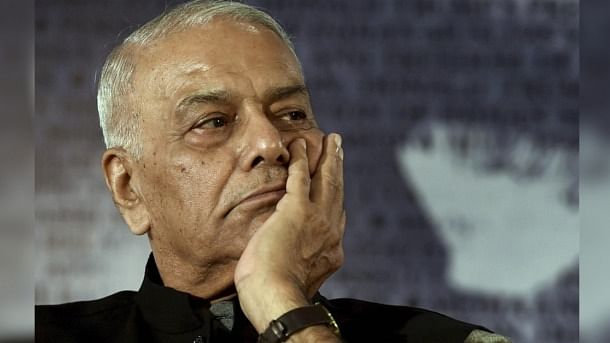
“Job aspirant at the age of 80 plus,” remarked the late Arun Jaitley when, in 2017, Yashwant Sinha betrayed his desperation to join the Narendra Modi government.
Sinha and Jaitley were cabinet colleagues in the Atal Bihari Vajpayee government. However, Modi rebuffed Sinha in 2014, denying him a Lok Sabha ticket from Hazaribagh, his parliamentary constituency in Jharkhand. Instead, Modi gave his eldest son Jayant the Lok Sabha ticket from Hazaribagh and appointed him a minister when IIT-educated junior Sinha debuted as an MP in 2014.
Marginalised within the BJP, Sinha, a former Union finance minister, announced his retirement from active politics at a function in Patna in 2018. “Henceforth, I will not accept any post in any party or government,” he declared.
But the man known as the ‘rollback finance minister’ for rolling back fuel price hikes, has rolled back his decision to retire from politics. First, he joined the Trinamool Congress on the eve of West Bengal Assembly polls in 2021 and became its vice-president, playing second fiddle to party chief Mamata Banerjee. On Tuesday, he quit the Trinamool, stating that time has come for him to work for greater Opposition unity.
Sinha has been named the Opposition candidate for the presidential poll slated for July 18. “I am grateful to Mamata ji for the honour and prestige she bestowed on me in the TMC. Now a time has come when for a larger national cause, I must step aside from the party to work for greater Opposition unity. I am sure she approves the step,” tweeted Yashwant on Tuesday.
High ambition
Born and brought up in Patna, the bureaucrat-turned politician has always overestimated himself. In December 1989, when the V P Singh cabinet was being sworn in, Sinha refused to take oath. He was miffed at being offered a Minister of State (MoS) portfolio. Sinha was then a Rajya Sabha member representing the Janata Dal. V P Singh felt Sinha was junior in politics as it was his first term as an MP. But Sinha insisted on a cabinet berth, a request that was denied.
In November 1990, Sinha shifted his allegiance to Chandra Shekhar, who split the Janata Dal to form the Samajwadi Janata Party and succeeded Singh as the prime minister. Sinha was appointed the Union finance minister in the shortlived Congress-backed government, which lasted from November 1990 to June 1991.
In 1991, he contested the Lok Sabha polls from Patna as the SJP candidate but the election was countermanded because of unprecedented violence in the state capital. Later, Sinha contested the 1995 Assembly polls from Hatia (near Ranchi), then in undivided Bihar, as the BJP nominee. After romping home, he was elected Leader of the Opposition in the Bihar Assembly. However, he quit in 1996 after his name cropped up in the Jain-Hawala case and Sushil Modi succeeded him.
Born in 1937 in Patna, Sinha’s fortunes reversed in 1999 when he won the Lok Sabha poll from Hazaribagh (then in undivided Bihar). A protege of L K Advani in the BJP, Sinha was appointed the Union finance minister in 1999, where he continued till the UTI scam rocked the nation in 2001-02. Soon after the UTI chairman was arrested, Sinha was removed as the FM in 2002 but appointed the country's external affairs minister.
In 2004, Sinha lost his Lok Sabha seat as the Vajpayee government bowed out of power. He returned to the Lok Sabha in 2009 but has remained mostly in political wilderness for the last two decades. An IAS officer who took voluntary retirement in 1984, Sinha had also served as an aide to the Bihar Chief Minister Karpoor Thakur in the late 1970s.
Today, Sinha today has more enemies than friends across parties. The ambitious octogenarian, who claims to have neither tired nor retired, is now fighting his last battle for the country’s top post.